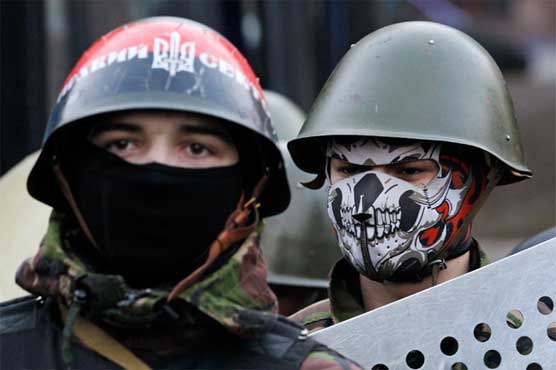Ukraine rebels say will talk to mediators Thursday

Previous negotiations fizzled out after two rounds in late June.
KIEV (AFP) - Rebel leaders in eastern Ukraine will hold a videoconference Thursday with a group of mediators to discuss talks on a possible truce, a top separatist chief said Wednesday.
Plans for similar Internet negotiations between the separatists and a trilateral Contact Group involving representatives of Ukraine, Russia and the OSCE fell through Tuesday leading negotiators to slam the rebels for not being committed to talks.
Andrei Purgin, deputy prime minister of the self-proclaimed "Donetsk People s Republic", told AFP by telephone that the consultation would take place "tomorrow evening" but that the exact time was yet to be decided.
Previous negotiations fizzled out after two rounds in late June and have not resumed since Ukrainian President Petro Poroshenko tore up an unsuccessful ceasefire to relaunch a military offensive against the rebels.
Since then Ukrainian forces have retaken a string of key towns but both sides are coming under increasing international pressure to stop three months of fighting that has claimed some 600 lives.
Earlier, The EU moved closer to tightening sanctions against Russia over the crisis in Ukraine on Wednesday, though stopping short of the tough line called for by Washington.
"Not much has happened since the visit of the Ukrainian president at the last summit" in June, German Chancellor Angela Merkel said as she arrived for a new meeting of EU leaders to discuss Ukraine as well as fill top EU posts.
"We will talk about new sanctions because we think that the Russian contribution for peace in Ukraine is not sufficient," she added.
According to a draft summit statement seen by AFP, new steps could include freezing programmes in Russia run by the EU s European Investment Bank as well as a request that the European Bank of Reconstruction and Development halt its own work in the country.
So far the EU has targetted more than 70 Russian and Ukrainian figures with visa bans and asset freezes under what are known as "Phase 2" measures.
"What is expected is a certain escalation of sanctions but that does not reach Phase 3," said French Foreign Minister Laurent Fabius, referring to the EU term for sanctions that would target entire sectors of the Russian economy.
"We must at the same time show resolve and maintain dialogue," Fabius added.
The move in Brussels comes amid increasing frustration in Washington towards the EU s cautious approach.
The United States has hinted it is preparing to adopt its own punitive steps against Russia s defence and financial sectors.
The EU is divided over whether to adopt the US hard line because some member states, such as Italy and Germany, are wary of putting major economic ties with Moscow in jeopardy.
Germany and France have been spearheading EU efforts to revive a Ukrainian truce in the hope more sanctions against Russia could be avoided.
Earlier Wednesday, Merkel s office said she and Ukrainian President Petro Poroshenko had agreed by phone that "Russia has been insufficient in meeting expectations" on steps to end Ukraine s worst crisis since its independence from Moscow in 1991.
At last month s summit attended by Poroshenko, EU leaders said Moscow must clearly back his Ukrainian peace plan and cut off the flow of arms to the country s rebels in order to avoid new sanctions.
Despite conciliatory signals by Moscow, violence between Kiev forces and separatists still flares with more than 600 killed since the beginning of the crisis.
"The situation in Ukraine is unacceptable," said British Prime Minister David Cameron, arriving for the talks.
"We need to send a very clear message with clear actions," he added.

